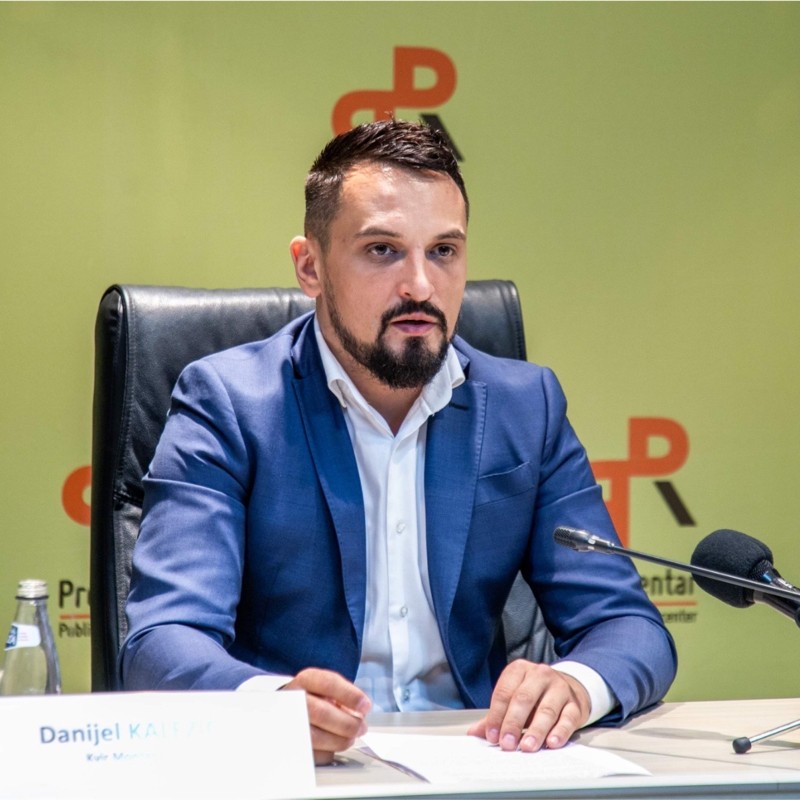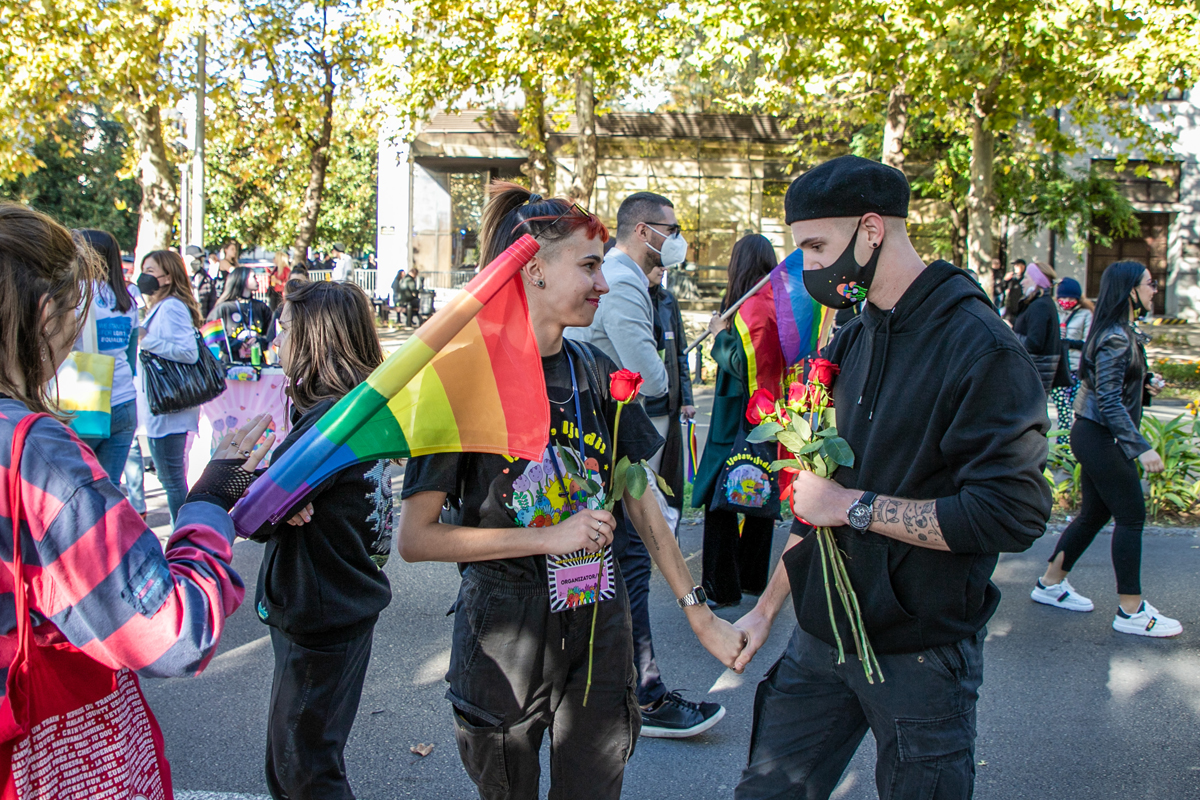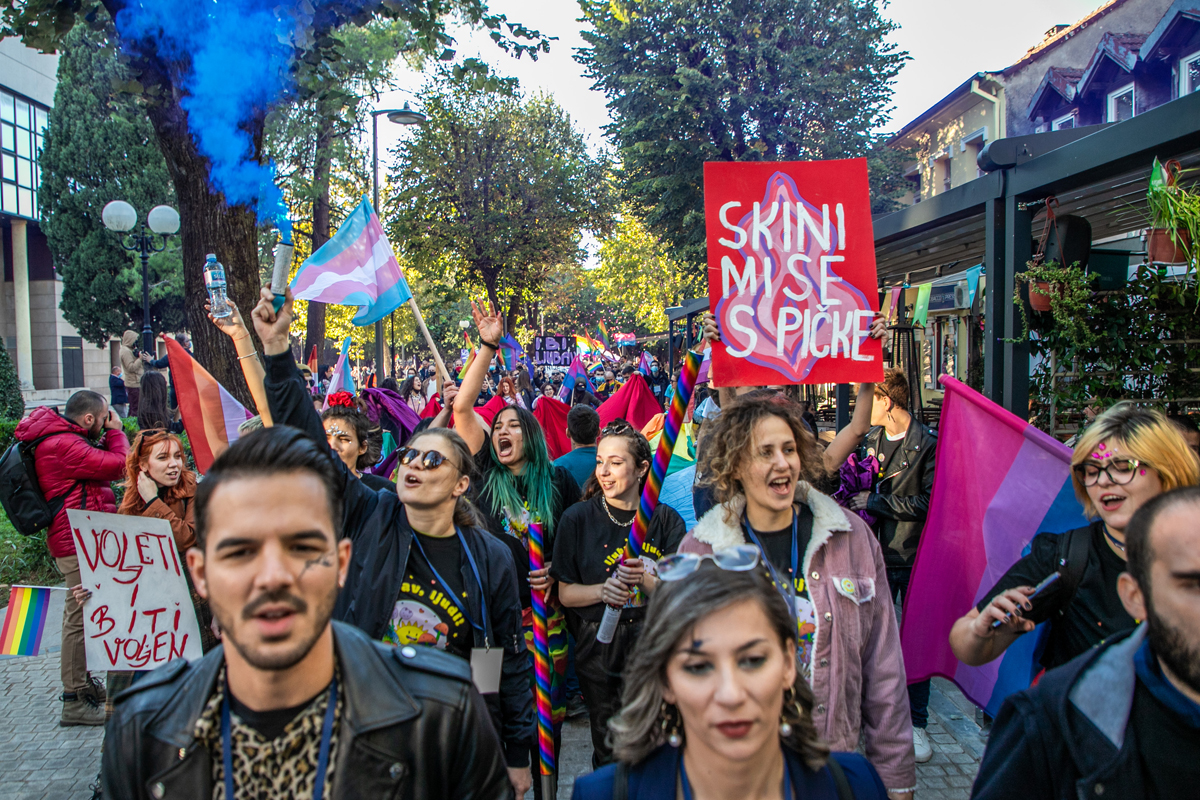In the three years since Montenegro’s Parliament passed a law codifying partnerships for same-sex couples, the vast majority of registered partnerships have been between foreigners. Same-sex couples may enter into life partnerships in Montenegro, but their lives take place abroad.
“Once we get our partnership registered, we’ll be either the first or second gay couple that has decided to stay and live here,” said Alen and Igor (their real names are known to K2.0).
The Law on Life Partnership of Persons of the Same Sex was enacted on July 1, 2020, providing same-sex partners with all rights enjoyed by married or cohabiting heterosexual couples, except for adoption.
The law’s implementation began a year later, when the first life partnership was registered in Budva. Subsequent registrations of same-sex unions in Budva have followed, as well as in Bar, Herceg Novi and Podgorica, with the total number now exceeding 75.
Local CSOs attest that the majority of registered same-sex partnerships are between foreign nationals.
“Most of the couples that we offer legal assistance and support to with regard to partnership registration come from abroad, though there are some occasional cases where one of the partners is a Montenegrin citizen,” said John Barac, the executive director of LGBT Forum Progres.
According to Danijel Kalezić, executive director of the LGBTI Equal Rights Association for the Western Balkans and Turkey (ERA), it is no surprise that most same-sex couples who register their partnerships in Montenegro live outside the country. Even though same-sex unions have been legalized, he concurred that Montenegrin society continues to “suffer” from relatively clear symptoms of homophobia.
Barac recalled that the first same-sex partnership ceremony in Podgorica was secured by the police as a precautionary measure. None of the subsequent ones had any police presence, but he noted that most public institutions — including the Montenegrin Parliament — have failed to do their part in terms of regulating the rights granted under same-sex unions.
“They are yet to draft amendments to numerous laws in order to harmonize them with this one. If already drafted, amendments are waiting to be adopted. All this has resulted in considerable legal uncertainty within the entire system, so the process remains unfinished to the detriment of the LGBTI community and human rights in Montenegro,” Barac said.

Danijel Kalezić, the executive director of ERA — the LGBTI Equal Rights Association for the Western Balkans and Turkey. Photo: PR Centar.
Nine months after the law was passed, a number of NGOs submitted a proposal to the Montenegrin government to integrate applicable regulations. The proposal was backed by an analysis of the normative framework, a set of specific amendment recommendations and a list of bylaws that need to be harmonized or prepared and approved. In practice, this would include — but not be limited to — conferring guaranteed rights on same-sex partners in case of separation or death. However, this is yet to come to fruition.
In the meantime, two governments have come and gone, with another now in the making.
The Law on Same-Sex Partnerships was adopted three years ago and came into effect a year later, yet the Interior Ministry has not set up a partnership record. Consequently, partnership certificates are still issued by local authorities, i.e. the municipality that has registered the given union.
As there is no partnership record, status checks are hampered, and it is difficult to verify whether a person intending to enter into a same-sex union in one municipal jurisdiction has already done so in another.
“We believe that the Interior Ministry should keep a partnership register as Article 9 of the Law on Life Partnership of Persons of the Same Sex provides that ‘a person cannot enter into a life partnership until any partnerships or marriages they previously entered into have been dissolved.’ Hence, the relevant central institution should keep record of partnerships in order to be able to issue single partnership status certificates, as is the case with single marital status certificates. Such certificates issued by the competent authorities are the only legally valid proof of civil status; in specific cases, this enables the registrar to establish that one of the two parties intending to enter into a partnership (or both) has terminated any partnerships or marriages they may have registered with the same or another person in another municipality of Montenegro,” the Old Royal Capital of Cetinje Mayor’s Office explained.
The same issue has been raised by other municipalities, including the Capital City of Podgorica.
“One of the issues surrounding the implementation of this law is that the relevant ministry keeps no life partnership record, which prevents them from issuing single partnership status certificates,” the Capital City of Podgorica said in its reply to K2.0.
The Interior Ministry failed to respond to K2.0’s inquiry on the establishment of such records. Meanwhile, the Capital City of Podgorica made additional observations about same-sex partnership regulations.
“A distinction is made between the Law on Family and the Law on Same-Sex Partnerships as partnership ceremonies are not attended by city council members, who are supposed to solemnize and effectively validate them,” said the cabinet of Podgorica Mayor, Olivera Injac.
“All in all, however, the implementation of this law as well as the lives of same-sex couples themselves are far below the generally accepted standards of human rights and dignity.”
Kalezić from ERA sees traces of homophobia in the fact that city council members are under no obligation to attend partnership ceremonies.
Furthermore, the Capital City of Podgorica said that the law fails to set out any sort of recognition procedure for international court decisions or documents, so “there is still no legal basis for registering any partnerships Montenegrin nationals may have entered into abroad.”
Because of this, LGBT Forum Progres sued Montenegro last year.
“This is just one of the many examples of things not going as smoothly in practice. It should be noted that our case is still pending. All in all, however, the implementation of this law as well as the lives of same-sex couples themselves are far below the generally accepted standards of human rights and dignity,” said Barac from LGBT Forum Progres.
Institutional homophobia
Kalezić mentioned that one family has filed two lawsuits against the state of Montenegro because the children are yet to obtain their citizenship even though one of the parents is a Montenegrin citizen.
Marijana Laković-Drašković, the plaintiffs’ attorney, has told local media that discrimination begins to show when this case is compared and contrasted with cases of other families and children who follow similar or identical citizenship acquisition procedures.
Kvir Montenegro, the organization that has supported this family throughout the case, said that the message LGBTQ+ people in Montenegro get from all this is clear: Montenegrin society still denies their basic human right, which is “the right to family life, thereby pushing them to the margins of existence.”
Even the Ombudsperson has called on the Interior Ministry to legally rectify this issue, but to no avail as of yet.
In March, the Ombudsperson launched a case to determine whether discriminatory elements are present in the Health Ministry’s codes and ordinances related to sterility treatment. The case centers on the fact that reproductive cell donation remains limited for people who have engaged in homosexual relations within the previous five years.
The Ombudsperson has also received a complaint about a rule of procedure pertaining to single women’s right to assisted reproductive technology (ART). Current regulation states that ART rights are reserved only for women who can prove their single status, something that Kalezić has branded as “institutional homophobia.”

Montenegro Pride 2021. Photo: PR Centar.
As explained by municipal authorities, partners who wish to register a life partnership are required to provide their IDs or passports, birth certificates, certificates of no impediment (single marital status certificates, single partnership status certificates or other similar documents proving their civil status), the witnesses’ IDs or passports, proof of residence if they are foreign nationals and proof of administration fee payment.
K2.0 reached out to all of Montenegro’s municipalities, requesting information on the number of partnerships registered in their respective jurisdictions. The municipalities of Gusinje, Mojkovac, Danilovgrad, Kolašin, Tivat and the Old Royal Capital of Cetinje have no same-sex partnerships on record. These municipalities say there is no interest in such partnerships for the foreseeable future.
The Budva Municipality did not respond to our inquiries, but its public records show that it had registered 26 same-sex partnerships as of January 2023. Since the Law on Same-Sex Partnerships began to be implemented, 28 such unions have been established in the Capital City of Podgorica.
“In 2021, two same-sex partnerships were established, with one citizen of Montenegro involved. Twelve partnerships were established in the following year, with two citizens of Montenegro involved. Over the course of this year, 14 partnerships have been established, with four citizens of Montenegro involved,” the Capital City of Podgorica said.
“On average, life partners are aged between 30 and 40, most of them being Russian nationals.”
The Municipality of Herceg Novi has registered 20 same-sex partnerships; one was concluded in 2021, 15 in 2022 and four in 2023.
“On average, life partners are aged between 30 and 40, most of them being Russian nationals,” said the municipal officials.
The Municipality of Bar has concluded four partnerships, one in 2021 between nationals of Kazakhstan and three in 2022 between Russian nationals. So far in 2023, there have been no newly established partnerships, but the municipal officials registered one that had been already entered into between a Montenegrin-American couple.
According to the website of a business that makes necessary arrangements for the related events, organizing a same-sex partnership ceremony costs between 900 and 3,500 euros.
The most affordable option includes consultations, document gathering and translation, fees and transportation to the ceremony venue as well as photo and video coverage of the ceremony, but not preparation of the ceremony itself.
For 3,500 euros, the couple gets airport meet-and-greet services, decorations, transportation around the clock, preparation of a banquet for up to ten people, four hours of video coverage, a boat trip…
The couple is first asked to send all required documentation via email so that the company can prepare it. Afterwards, the partners arrive in Montenegro, where they stay for a few days, either until immediately after the ceremony or until their partnership certificates are translated and ready to use as proof of partnership in their country of residence.
According to the website, the company can provide witnesses as well.
Barac said that LGBT Forum Progres is unaware if there have ever been any considerable issues concerning partnership ceremonies or other related events.
“Most couples who we’re in touch with opt for modest ceremonies, often inviting only witnesses or their closest friends/family. This points to a fundamental problem that we brought attention to even while the law was being drafted — Montenegrin society largely continues to reject the LGBTI community, while homophobia, biphobia, transphobia and discrimination are rampant all the same. Owing to all that, same-sex couples tend to keep their partnership ceremonies ‘low key’ in order to circumvent any potential adverse reactions,” he said.

Montenegro Pride 2021. Photo: PR Centar.
Alen and Igor also plan to make their partnership official further down the line. However, they rarely daydream about how and where they would celebrate that special day with their loved ones. They say that they have plenty of other things to worry about. As they rent an apartment, they have spent months waiting for their rental contract to be finalized so that Igor — who is not a Montenegrin national — could register his residence. They are also trying to take out a loan to finally purchase their own apartment.
These are more or less the same old concerns voiced by straight couples who are in a similar place — provided that their life choices are approved of by their closest circle.
“My folks have known I’m gay for years now and they would be OK with it if I’d only decided to remain single for the rest of my life,” Alen said.
He left that sentence unfinished, but the look in his eyes seemed to confirm the comment made by the K2.0 journalist: “Of course, because they wouldn’t have to explain themselves to people around them.”
In July 2013, Budva organized Montenegro’s first pride parade under heavy police presence. Members of the LGBTQ+ community believe that “the key social developments that have taken place since then stand precisely on the shoulders of the first Montenegro Pride.” Montenegro Pride’s 11th edition was held on October 21, 2023 in Podgorica.
Feature image: Montenegro Pride 2021. Photo: PR Centar.
The content of this article is the sole responsibility of K2.0. The views expressed in it are the author’s and do not necessarily reflect the views of K2.0.
Curious about how our journalism is funded? Learn more here.




